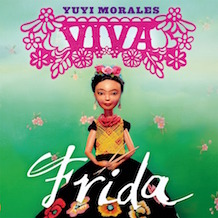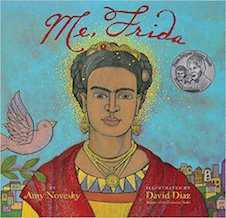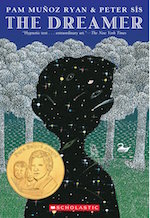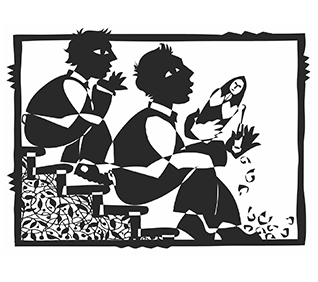
My Name is Román.
I am Hispanic, Hispano,
ooEspañol, Native American.
I live in New Mexico.
I am Latino.
[/wc_column][wc_column size=”one-half” position=”last”]Click to see:
> Questions to initiate and guide the Creative Reading Dialogue
> Activities students can do individually or in groups
> A creative writing Transformative Education activity
[/wc_column][/wc_row]Questions to Initiate and Guide the Dialogue
Descriptive Phase
[wc_fa icon=”arrow-right” margin_left=”” margin_right=””][/wc_fa] Why was Román worried about his brother Lupe? Was he right on being worried?
[wc_fa icon=”arrow-right” margin_left=”” margin_right=””][/wc_fa] Lupe made some important statement to Román. What are some of the things he told him?
Personal Interpretive Phase
[wc_fa icon=”arrow-right” margin_left=”” margin_right=””][/wc_fa] Román cared very much for his older brother Lupe. Are there people for whom you care very much?
[wc_fa icon=”arrow-right” margin_left=”” margin_right=””][/wc_fa] Lupe was able to discover that he enjoyed carving, and became good at it. Is there something you believe you could became passionate about?
[wc_fa icon=”arrow-right” margin_left=”” margin_right=””][/wc_fa] For Lupe his cultural identity became very important. What about your culture is important to you?
Critical/Multicultural/Anti-Bias Phase
[wc_fa icon=”arrow-right” margin_left=”” margin_right=””][/wc_fa] Lupe believed that to love something we need to learn about it and get to understand it well. What is your opinion about this statement?
Creative/ Transformative Phase
[wc_fa icon=”arrow-right” margin_left=”” margin_right=””][/wc_fa] How can you learn more about your culture? Is there anyone who could join you in discovering the richness of your own culture?
Activities Students Can Do Individually or in Groups
[wc_fa icon=”arrow-right” margin_left=”” margin_right=””][/wc_fa] In New Mexico it is easy to see the fusion of influences from Native Americans and Spanish explorers and pioneers. What are some of these manifestations in other parts of the United States? Students could illustrate this with a collection of images or a mural.
[wc_fa icon=”arrow-right” margin_left=”” margin_right=””][/wc_fa] If at all possible, plan a visit to a museum where students can see manifestations of Latino art. If a physical visit is not possible, plan virtual museum tours. Specific museums could be:
[wc_fa icon=”caret-right” margin_left=”30px” margin_right=””][/wc_fa] Washington, DC
[wc_fa icon=”angle-right” margin_left=”50px” margin_right=””][/wc_fa] Smithsonian Institute, Washington, DC – Latino Center: http://latino.si.edu
[wc_fa icon=”caret-right” margin_left=”30px” margin_right=””][/wc_fa] New York
[wc_fa icon=”angle-right” margin_left=”50px” margin_right=””][/wc_fa] Museo del Barrio, New York: www.elmuseo.org
[wc_fa icon=”angle-right” margin_left=”50px” margin_right=””][/wc_fa] Hispanic Society of America, New York: www.nps.gov/nr/travel/american_latino_heritage/The_Hispanic_Society_of_America.html
[wc_fa icon=”caret-right” margin_left=”30px” margin_right=””][/wc_fa] Chicago
[wc_fa icon=”angle-right” margin_left=”50px” margin_right=””][/wc_fa] National Museum of Mexican Art: www.nationalmuseumofmexicanart.org
[wc_fa icon=”caret-right” margin_left=”30px” margin_right=””][/wc_fa] California
[wc_fa icon=”angle-right” margin_left=”50px” margin_right=””][/wc_fa] Los Angeles County Museum of Art LACMA: www.lacma.org/art/collection/latin-american-art
[wc_fa icon=”angle-right” margin_left=”50px” margin_right=””][/wc_fa] Mexican Museum, San Francisco: www.mexicanmuseum.org/permanent-collection
[wc_fa icon=”angle-right” margin_left=”50px” margin_right=””][/wc_fa] Latino Art Museum, Pomona, CA: www.lamoa.net
[wc_fa icon=”caret-right” margin_left=”30px” margin_right=””][/wc_fa] Delaware
[wc_fa icon=”angle-right” margin_left=”50px” margin_right=””][/wc_fa] Delaware Art Museum: www.delart.org/exhibits/our-america-the-latino-presence-in-american-art
[wc_fa icon=”caret-right” margin_left=”30px” margin_right=””][/wc_fa] New Mexico
[wc_fa icon=”eangle-rightye” margin_left=”50px” margin_right=””][/wc_fa] National Hispanic Cultural Center, New Mexico: www.nhccnm.org
[wc_fa icon=”caret-right” margin_left=”30px” margin_right=””][/wc_fa] North Carolina
[wc_fa icon=”angle-right” margin_left=”50px” margin_right=””][/wc_fa] Levine Museum of the New South, Charlotte, North Caroline: www.museumofthenewsouth.org/exhibits/nuevolution-latinos-and-the-new-south
[wc_fa icon=”caret-right” margin_left=”30px” margin_right=””][/wc_fa] Texas
[wc_fa icon=”angle-right” margin_left=”50px” margin_right=””][/wc_fa] Guadalupe Cultural Arts Center San Antonio: www.guadalupeculturalarts.org
[wc_fa icon=”angle-right” margin_left=”50px” margin_right=””][/wc_fa] San Antonio Museum of Arta: www.samuseum.org/collections/latin-american-art
[wc_fa icon=”arrow-right” margin_left=”” margin_right=””][/wc_fa] On Unit III we suggested students could create a bank of positive adjectives. If you already created such bank, you can refer to it now. Otherwise you can refer to the suggestions on Unit III.
Invite students to identify Latin@s whose names or last names begin with letters existing in the students’ names and last names.
Then, ask them to create an acrostic where they use the names of Latin@s indicating why they admire them:
C like César Chávez I celebrate justice
A like Rudolfo Anaya I value my roots
M like José Martí I value friendship
I like Isabel Allende I want to be a writer
L like García Lorca I find poetry in my heart
A like Antonio Machado I say: “Let’s open our own roads.”
J like Benito Juárez I believe in peace
U every one I admire is Unique
A like Alicia Alonso I love ballet
N like Pablo Neruda I love poetry
A Creative Writing Transformative Education Activity
Frequently students do not have models or experiences of the positive transformations that human beings can achieve. Or, when they have been shown these models they refer to people distant in time and space. Yet, having these models can be very valuable.
—-This is why, the best way of carrying on this activity is to model it with an authentic book written by you, for example, the book: I was not always a teacher. This book will let your students appreciate the efforts you have made to become who you are..
[wc_fa icon=”arrow-right” margin_left=”” margin_right=””][/wc_fa] Invite students to create a book of Transformation.
The book we are suggesting for this theme can take many forms, for example: Before and After, I Used To, A Person Who Inspired Me, An important momento in my life.
We suggest that you look at specific examples on this topic, books written by teachers, students and parents at:
http://authorsintheclassroom.com/5-the-power-of-transformation
On that same website you will find information about Transformative Education and the Authors in the Classroom Process: http://authorsintheclassroom.com
Related Books
On the Struggle to Achieve Justice
Grades 2-4
[wc_row][wc_column size=”one-half” position=”first”]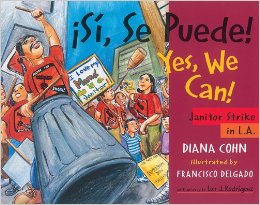 Yes, We Can!: Janitor Strike in L.A. by Diana Cohn
Yes, We Can!: Janitor Strike in L.A. by Diana Cohn
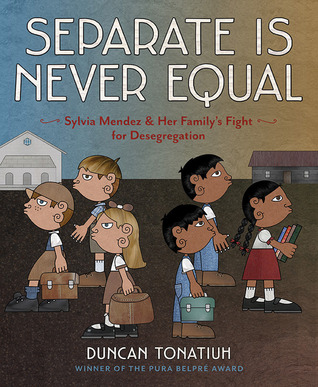 Separate Is Never Equal: Sylvia Mendez and Her Family’s Fight for Desegregation by Duncan Tonatiuh
Separate Is Never Equal: Sylvia Mendez and Her Family’s Fight for Desegregation by Duncan Tonatiuh
On Notable Latinos and Latin Americans
Grades 2-4
[wc_row][wc_column size=”one-half” position=”first”]Multiple Figures
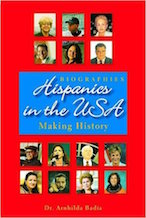 Hispanics in the US. Making History by Arnhilda Badía
Hispanics in the US. Making History by Arnhilda Badía
Multiple Figures
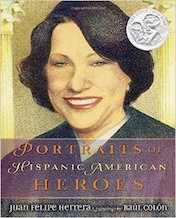 Portraits of Hispanic American Heroes by Juan Felipe Herrera
Portraits of Hispanic American Heroes by Juan Felipe Herrera
[/wc_column][/wc_row] [wc_row][wc_column size=”one-third” position=”first”]
Alma Flor Ada
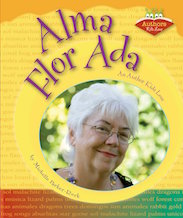 Alma Flor Ada. An Author Kids Love by Michelle Parker-Ross
Alma Flor Ada. An Author Kids Love by Michelle Parker-Ross
Alicia Alonso
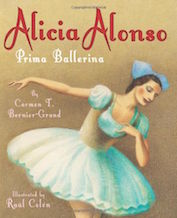 Alicia Alonso. Prima Ballerina by Carmen Bernier-Grand
Alicia Alonso. Prima Ballerina by Carmen Bernier-Grand
Pura Belpré
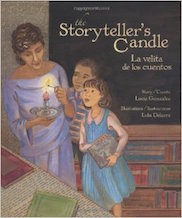 The Storyteller’s Candle by Lucía González
The Storyteller’s Candle by Lucía González
César Chávez and Dolores Huerta
[wc_row][wc_column size=”one-fourth” position=”first”]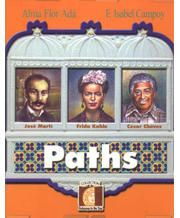 Paths. Biographies: José Martí/Frida Kahlo/César Chávez by Alma Flor Ada & F. Isabel Campoy
Paths. Biographies: José Martí/Frida Kahlo/César Chávez by Alma Flor Ada & F. Isabel Campoy
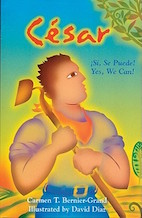 César. Yes We Can by Carmen Bernier-Grand
César. Yes We Can by Carmen Bernier-Grand
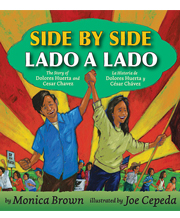 Side by Side: The Story of Dolores Huerta and César Chávez by Monica Brown
Side by Side: The Story of Dolores Huerta and César Chávez by Monica Brown
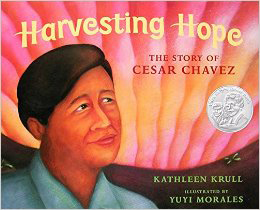 Harvesting Hope: The Story of César Chávez by Katherine Krull. Illustrated by Yuyi Morales
Harvesting Hope: The Story of César Chávez by Katherine Krull. Illustrated by Yuyi Morales
Frida Kahlo
[wc_row][wc_column size=”one-fourth” position=”first”] Paths. Biographies: José Martí/Frida Kahlo/César Chávez by Alma Flor Ada & F. Isabel Campoy
Paths. Biographies: José Martí/Frida Kahlo/César Chávez by Alma Flor Ada & F. Isabel Campoy
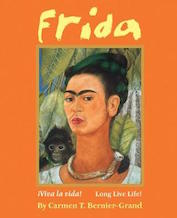 Frida. Long Live Life! by Carmen Bernier-Grand
Frida. Long Live Life! by Carmen Bernier-Grand
Gabriel García Márquez
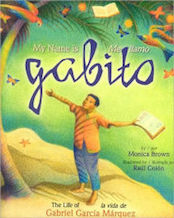 My Name is Gabito. The Life of Gabriel García Márquez by Monica Brown
My Name is Gabito. The Life of Gabriel García Márquez by Monica Brown
José Martí
 Paths. Biographies: José Martí/Frida Kahlo/César Chávez by Alma Flor Ada & F. Isabel Campoy
Paths. Biographies: José Martí/Frida Kahlo/César Chávez by Alma Flor Ada & F. Isabel Campoy
Gabriela Mistral
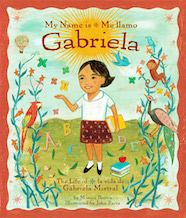 My Name is Gabriela by Monica Brown
My Name is Gabriela by Monica Brown
Pablo Neruda
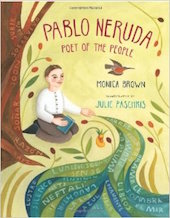 Pablo Neruda: Poet of the People by Monica Brown
Pablo Neruda: Poet of the People by Monica Brown
José Guadalupe Posada
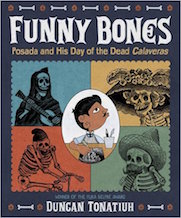 Funny Bones: Posada and his Day of the Death Calaveras by Duncan Tonatiuh
Funny Bones: Posada and his Day of the Death Calaveras by Duncan Tonatiuh
Diego Rivera
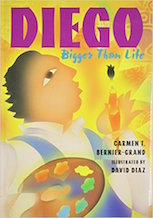 Diego. Bigger than Life by Carmen Bernier-Grand
Diego. Bigger than Life by Carmen Bernier-Grand
Diego Rivera
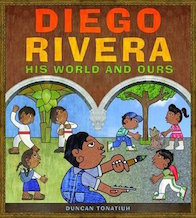 Diego Rivera. His World and Ours by Duncan Tonatiuh
Diego Rivera. His World and Ours by Duncan Tonatiuh
Tomás Rivera
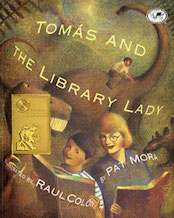 Tomás and the Library Lady by Pat Mora
Tomás and the Library Lady by Pat Mora
Pablo Picasso
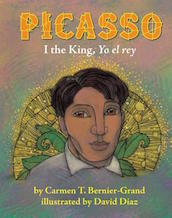 I, the King by Carmen Bernier-Grand
I, the King by Carmen Bernier-Grand
Grades 4-8
[wc_row][wc_column size=”one-fourth” position=”first”]Multiple Figures
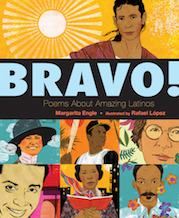 Bravo! Poems About Amazing Hispanics by Margarita Engle
Bravo! Poems About Amazing Hispanics by Margarita Engle
On César Chávez
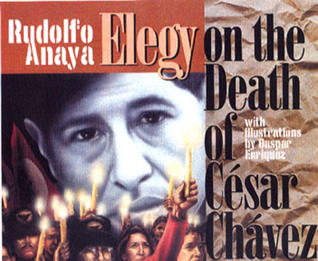 Elegy on the Death of César Chávez by Rudolfo Anaya
Elegy on the Death of César Chávez by Rudolfo Anaya
On Pablo Neruda
[/wc_column][wc_column size=”one-fourth” position=”last”]On Sonia Sotomayor
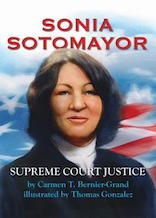 Sonia Sotomayor. Supreme Court Justice by Carmen Bernier-Grand
Sonia Sotomayor. Supreme Court Justice by Carmen Bernier-Grand

